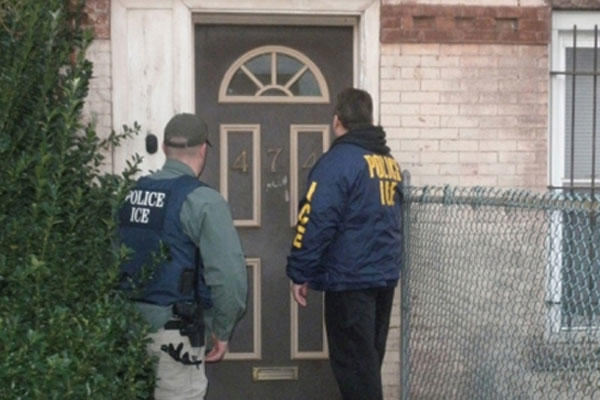The Obama administration has directed Immigration and Customs Enforcement to no longer deport undocumented aliens who are spouses, children or parents of U.S. military personnel and veterans.
The White House took the action in response to Defense Department concerns over troops' families being ripped apart by the forced removal of a relative who is in the country illegally.
"Military preparedness can potentially be adversely affected, if active members of the U.S. Armed Forces and individuals serving in the Selected Reserve of the Ready Reserve, who can be quickly called into active duty, worry about the immigration status of their spouses, parents and children," states the official memo released by the U.S. Customs and Immigration Service.
The same goes for veterans "who have served and sacrificed for our nation," the policy states.
The bottom line for these families is that a spouse, child or parent determined to be illegal will be allowed to "parole in place" while they apply for legal residency and citizenship.
Margaret Stock, an immigration attorney and a Military Police lieutenant colonel in the Army Reserve, said the new policy is great news for thousands of active-duty, reserve and Guard troops who currently or potentially would be suffering through the difficulty of seeing a family member threatened with deportation.
Stock, a leading expert in immigration law, said parole-in-place has long been an option but has never before been so clearly directed toward servicemembers and veterans.
Previously, decisions were arbitrary and not applied equally state to state. The new policy is clear and "binding on all [immigration] offices around country. Now we have uniformity," said Stock, whose book "Immigration Law and the Military," is considered a resource for that specialized area of the law.
As an example of just how uninformed deciding officials were when it came to the parole-in-place provision, Stock noted a March 2013 rejection of an application by the Nebraska field office of USCIS on the grounds that the applicant's family member is not in "the U.S. Armed Forces," but is in "the Army National Guard."
Stock said she has represented dozens of clients seeking parole-in-place waivers and has taught seminars on it to other immigration lawyers across the U.S. She said the number of people -- and families -- who will benefit from the new policy is in the thousands.
Stock testified on the need for more clear policies back in 2008, telling a subcommittee of the House Judiciary Committee that the government had created an "extremely complex and often arbitrary system of immigration laws and regulations without full attention to the detrimental impact that this system has on the readiness of the U.S. Armed Forces."
She then recounted the story of Army Staff Sgt. Alex Jimenez of Massachusetts, whose wife, Yaderlin, was being processed for deportation to Guatemala while he was in Iraq, and under removal orders when, in 2007, Jimenez was captured by enemy forces following a firefight.
Though Jimenez had previously filed paperwork seeking legal status for his wife, the Department of Homeland Security rejected it because Yaderlin had not entered the country legally. Even after he went missing, Stock told lawmakers, "the Department of Homeland Security stood firm; she was not to be granted any special grace due to her status as the spouse of a deployed soldier."
That all changed after then-Sen. John Kerry, D-Mass., wrote a letter to then-DHS Secretary Michael Chertoff and the press began writing about the Yaderlin's plight.
"Secretary Chertoff suddenly exercised his authority to grant 'discretionary parole' to Yaderlin," Stock testified. "Once she had been granted parole, Yaderlin was immediately eligible to adjust her status, despite her unlawful entry."
Two months after Stock testified -- and more than a year after he went missing -- Jimenez' body was found in the so-called "Triangle of Death" south of Baghdad.
Had Kerry not intervened and the media not picked up on the story, Yaderlin would have had to go back to Guatemala and apply for legal admission to the U.S. -- after a 10-year minimum wait, said Stock. At the same time, as the widow of a fallen American soldier, she would have been entitled to benefits that she could not use in Guatemala, she said.
This is the Catch-22 that the new policy should eliminate for servicemembers and veterans with a spouse, child or parent who entered the U.S. without authorization.
"I've had cases where the citizen [soldier] is wounded or dead, and the parents are eligible for benefits but can't get them without leaving the country [first], and if they leave they can't come back for 10 years," Stock said. It's unfair, Stock says, that a parent "sacrifices a child in service to America but can't take advantage of the benefits."
An earlier version of this story incorrectly identified the U.S. Customs and Immigration Service as the agency directed to stop deporting family members of servicemembers and veterans. Immigration and Customs Enforcement is the agency responsible.



























